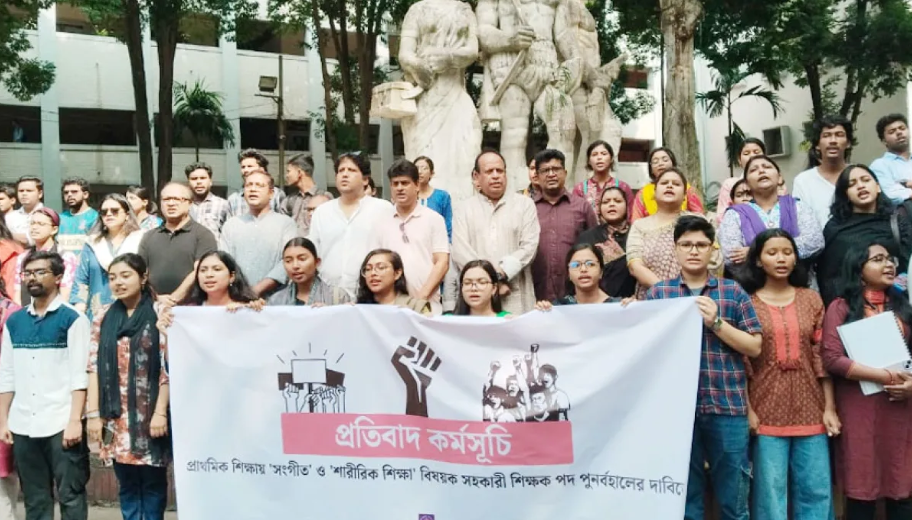Government cuts music and physical education in primary schools
The decision not to recruit music and phys ed teachers comes in for harsh criticism. For a choir director, it “is like removing a part of our humanity.” Human Rights Forum Bangladesh urges politicians to resist “unreasonable demands." Youth protests at the capital's university. Student told AsiaNews that “an entire generation” is “at risk of cultural impoverishment.”
Dhaka (AsiaNews) – The Bangladesh government has reversed its plan to recruit music and physical education teachers for primary schools, undermining two educational sectors already deemed secondary.
This has sparked strong criticism from human rights groups, educators, and those who believe in the importance of culture. Critics warn that the decision weakens a well-rounded education for boys and girls, eroding cultural and human values.
The decision comes after the government amended the Primary Teacher Recruitment Rules 2025 and withdrew a previous notification that promoted these two subject matters.
The move has raised concerns that education policy is being influenced by ideological and religious pressures rather than pedagogical priorities.
Among those opposing the decision is Alphonse Pankaj Gomes, choir director of St Mary's Cathedral in Dhaka.
“Music should be part of daily prayer because through music one can reach the Creator. It expresses devotion to God and makes life beautiful,” he told AsiaNews.
For Gomes, music is essential not only for spiritual life, but also for building empathy and harmony within society.
“If music is practised in every home, people will become compassionate and happy. Music and physical education are part of life. They help children develop their talents. Cancelling these subjects is wrong, and I protest this decision,” he stated.
The Human Rights Forum Bangladesh (HRFB) also condemned the government's move, calling it “unreasonable” and harmful to the cultural spirit rooted in the country’s education system.
In a statement signed by Sanjeeb Drong, a member of the HRFB's governing committee and secretary general of the Bangladesh Indigenous Peoples Forum, the organisation laments that the government's decision restricts professional freedom and hinders human development.
The HRFB maintains that the government's explanation is unconvincing.
On Tuesday, government officials said that the initial plan was to hire an equal number of music and physical education teachers for 2,500 school clusters.
However, the plan was abandoned following a committee's recommendation that hiring such a small number of teachers would bring "no effective benefit" and could create "discrimination."
Among its rationale, the government noted that Bangladesh has 65,569 government primary schools, making the immediate implementation of the hiring structure "impossible."
It suggested that the creation of new subject-specific posts could be considered at a later date, depending on available financial resources.
The HRFB believes that the real reason lies elsewhere. Since the new recruitment rules were issued on 28 August, several political and religious groups have publicly called for the appointment of "religious teachers" instead of music teachers.
Some even threatened protests if the government did not comply with their demand.
“In this context, the sudden change in policy shows that the government has bowed to pressure from these groups,” the HRFB said. “Instead of finding a phased approach or addressing budget constraints, the authorities have removed two vital subjects from primary education. This sets a negative precedent for a democratic and pluralistic state.”
For their part, human rights advocates insist that music and physical education are not luxuries, but essential components of a holistic education, fostering creativity, discipline, and emotional intelligence – needs that, according to critics, Bangladesh must nurture in its young generation.
The HRFB urges the government to reconsider its decision and restore teacher recruitment. It also called on politicians to resist "unreasonable demands" from any group when shaping education policies.
For Gomes and many others, the issue goes beyond curriculum design. “Music connects us to God and to each other,” he said. “Removing it from schools is like removing a part of our humanity.”
Yesterday, students from the Department of Music at the University of Dhaka protested on campus against the government's decision. A student, who requested anonymity, spoke to AsiaNews.
“We express our deep concern and disappointment over the cancellation of recruitment for music and physical education teachers in primary schools,” they said. “These subjects are not mere entertainment; they are integral to the mental, moral, and cultural development of children.”
In fact, “Music and physical education nurture creativity, confidence, and human values.” This “will also put an entire generation at risk of cultural impoverishment,” the student added.







.png)










